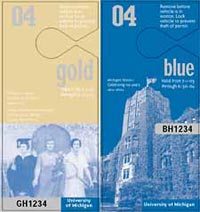Most U-M employee parking permit fees will increase each of the next three years at a rate less than the average yearly increases of the previous 12 years, University officials said Feb. 19 at the Board of Regents meeting.

Most permits will increase 4.6 percent in 2005, 4 percent in 2006 and 3 percent in 2007. The average annual increase since 1992 has been 6.4 percent.
Parking permit fees provide funding for all parking activities, including debt service for new structures, annual maintenance projects and all daily operations. A long-range strategic parking and transportation plan was presented to the regents in September; it included the construction of three new parking structures in the next four years, providing a net increase of 1,100 spaces from 2003 levels. The new structures will be at Observatory and Ann streets in the Cardiovascular Center complex, at 1127 E. Ann St., and on Division Street west of the Thompson Street Parking Structure.
“We’ve worked aggressively to streamline our parking expenses while implementing numerous parking and transportation initiatives to meet our growing demand across campus,” says Hank Baier, associate vice president for facilities and operations. “At the same time, we’ve explored several options to fund new parking structures that are desperately needed, particularly in our Medical and Central campus areas. This permit rate increase plan helps us address these needs, while recognizing the need to keep permit fees as low as possible for the majority of our faculty and staff.”
One exception to the modest rate increases is the employee contribution for gold permits, which allow users to park in select spaces in closer proximity to many key buildings. The rate increase for this group of approximately 1,400 permits will be 4.5 percent in 2005, followed by 10 percent each of the next two years.
“The larger increase for gold permits will bring that rate in three years to $1,265 annually, compared with the rate charged for spaces in the city’s central business district, currently at $1,260 annually,” Baier says. “Our plan includes creation of additional gold permit parking spaces, the most convenient spaces in our system.
“Yellow and orange permits are valid in more remote areas and usually require a short walk or ride on our commuter buses to reach most of our buildings. We will continue our economic incentives for these permits in order to help reduce the pressure on our Central and Medical campus parking areas.”
The financial and budgetary implications of the long-range parking and transportation strategic plan, along with the proposed rate structure, were analyzed by the Office of the Provost, the Office of the Chief Financial Officer and the Health System prior to final approval.
Sales in 2004 for the four permit options listed in the chart were 1,400 gold, 13,000 blue, 2,500 yellow and 3,000 orange. The parking permit year mirrors the University’s fiscal year, extending from July 1-June 30.

